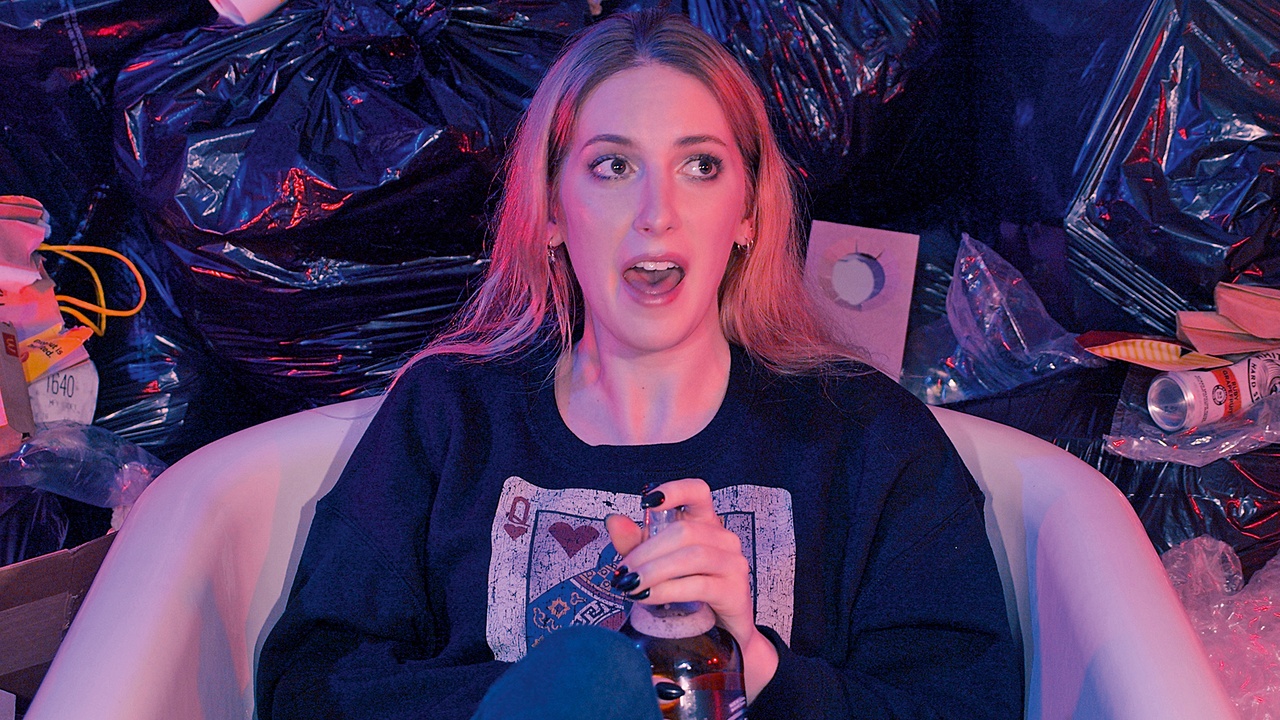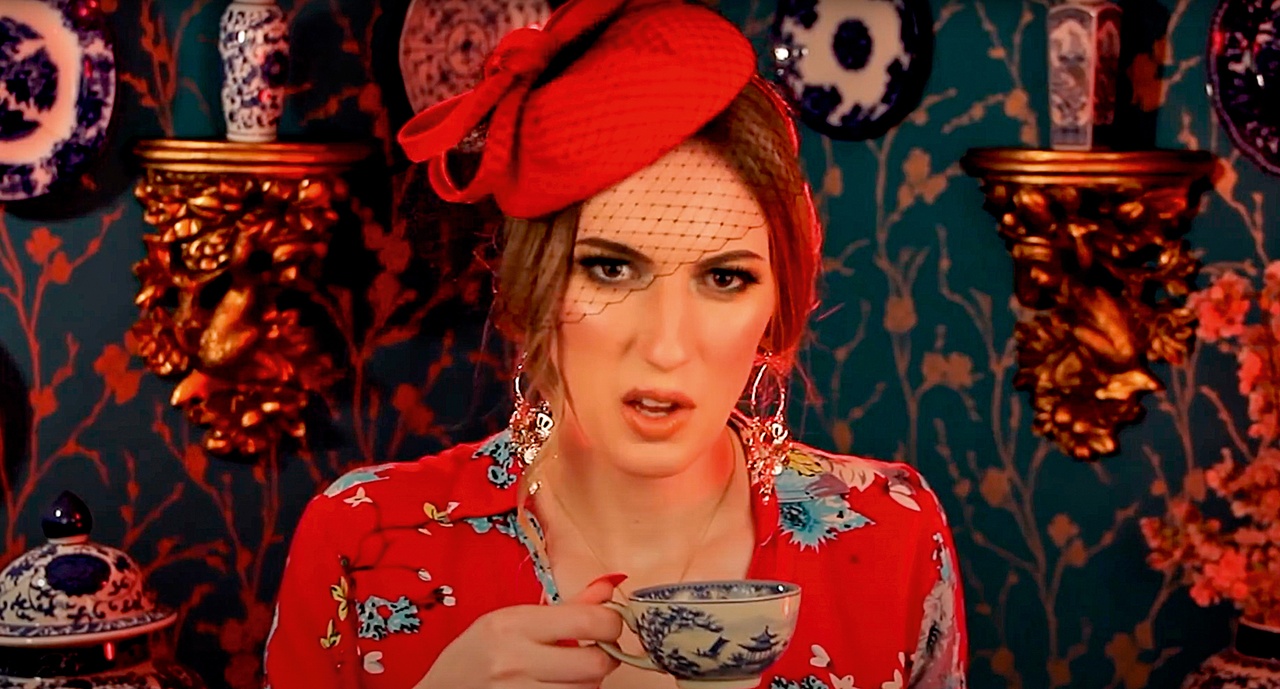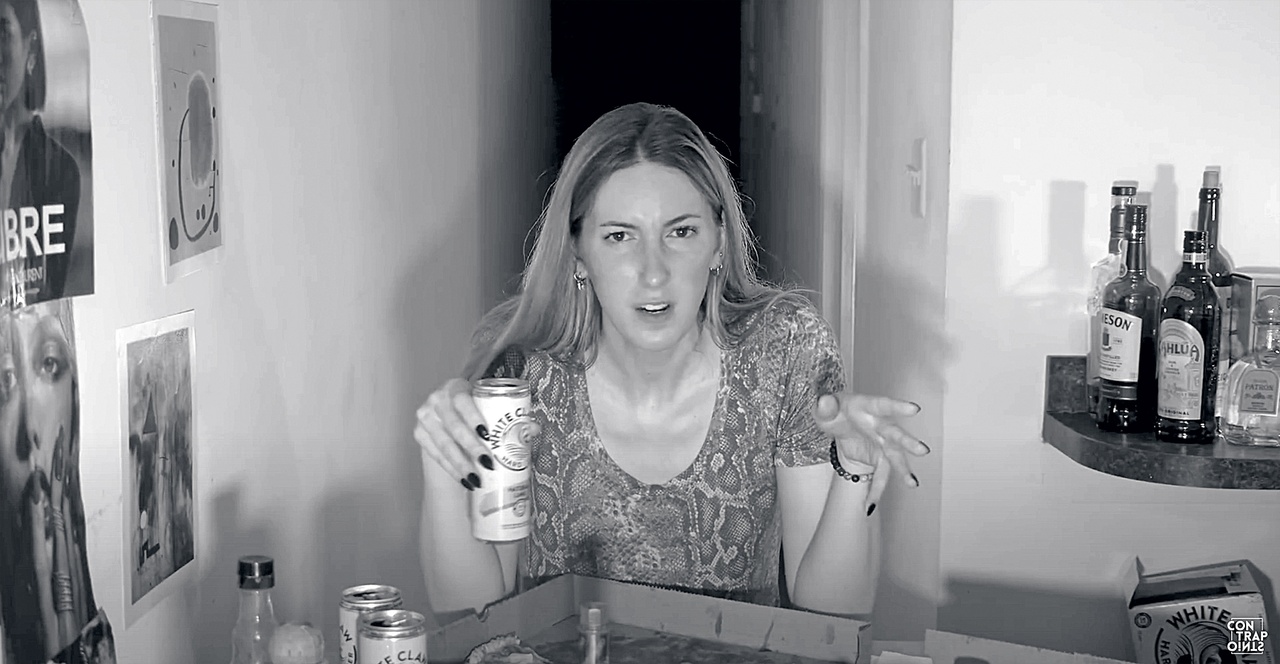BATHING IN CONTROVERSY: NOTES ON NATALIE WYNN’S “CONTRAPOINTS”

ContraPoints, „Canceling“, 2020, Videostill
DECEMBER 1, 2021
I’ve been putting off getting started on this text for a few days now. The problem, as so often, is that I want to say too many things at once. I want to write about Natalie Wynn’s YouTube channel ContraPoints and offer an appreciation of her work as a form of criticism. In doing so, it is important for me to do justice to its aesthetic and political dimensions. But in addition to that, I’m thinking about framing Wynn’s video essays as an exemplary form of dissent production, so I’m going to have to cover that too. And I also want to map out the main advantages of the concept of dissent, as compared to “antagonism,” for example. So what this text basically aims to do is to introduce Wynn’s entertaining and informative video essays on extremely controversial topics while considering them as a practice of dissent – a practice that holds lessons for art critics as well.
First, some information: Wynn is a glamorous trans woman and a brilliant speaker who regularly tackles contentious subjects, including “Opulence,” “Canceling,” “J. K. Rowling,” and “Envy” on ContraPoints, her YouTube channel. [1] She has an enormous following (1.5 million subscribers), and her queer-feminist reflections on contemporary issues have particular appeal among the younger segments of the art world. [2] Hot topics are what Wynn best likes to address: highly controversial and symbolically loaded subject matter. Given her own controversial standing in the trans community – not least because of how she made her own transition public – to even make reference to Wynn is to risk becoming a target oneself. But apart from the fact that these self-conscious misgivings are highly conventional tropes, especially in the context of issues like canceling, the “Wynn method” seems to offer so many epistemological insights that I am prepared to take on this (illusory?) risk.
DECEMBER 2, 2021
Wynn’s overall approach is characterized by her multi-perspective role-playing. She almost literally takes differences of opinion – what dissent is ultimately composed of – onto herself, playing out all the various positions involved. In doing so, she sometimes puts herself in the position of her opponents, presenting their points of view as well. For example, in “Canceling” (January 2020) – the video I mostly make reference to in this piece – she reads out hateful, defamatory tweets directed at her, only to eloquently invalidate most of them with her bright commentary. [3] Since Wynn, by her own account, always strives for a “fair and balanced presentation,” her polyvocal performance also gives a say to those whose opinions she in no way shares.
Wynn tries to do justice to “cancelation” as a phenomenon through an approach that counteracts the practice by assuming different perspectives and examining it in various ways. As Wynn repeatedly emphasizes, online shaming is an important tool that the powerless can wield against the powerful, using it to publicize experiences of abuse and discrimination. This is what happened in the context of #MeToo, when the Weinsteins of this world were rightly held to account for their actions. However, this does not imply the existence of a ubiquitous “cancel culture” – a fantasized notion that largely originated on the political Right, which Wynn rejects. Evoking the imaginary threat of a supposedly hegemonic cancel culture often aims at blocking the participation of marginalized people and delegitimize their legitimate claims.
Wynn maps out the potential of cancelation to help advance social struggles, but she also points to its negative flipside, when shaming, even in circles like the trans community, turns into a “sadistic entertainment spectacle.” Taking the example of James Charles, a temporarily canceled “beauty guru,” Wynn shows how canceling can also be used as a tactic to remove a business rival. She quotes the view, held by many “progressives,” that canceling does not actually exist, since it simply amounts to finally holding powerful people accountable for their behavior. She contrasts this with statements made by comedians, who complain that cancel culture is out of control, producing a culture in which it is no longer possible to make a joke. But even as she outlines this position, her video switches from color to black and white, a device Wynn often uses as a way of distancing herself from the position she is presenting at that moment. Sometimes Wynn uses lighting changes or quick cuts as a way to distance herself from what she is saying, to mark a viewpoint that is not her own, or to flag an ironic standpoint.
Ultimately, Wynn rejects both of the perspectives she presents, suggesting that they are both false: on the one hand, the idea that canceling does not exist, and on the other, the claim that a supposedly dominant cancel culture prevents people from saying anything at all. What she wants to do in the video, she suggests, is to track down the truth. However, she utters the word “truth” in a whisper, relativizing its universal claim. Wynn follows this with a whispered confession that she is transgender, thus announcing the position from which she is speaking while at the same time caricaturing the desire for authenticity that nourishes the confessional mode.

ContraPoints, „Gender Critical“, 2019, Videostill
DECEMBER 3, 2021
One reason I’m such a fan of Wynn is that her method in her ContraPoints video essays reminds me of how the various issues of Texte zur Kunst are conceived. Like Texte zur Kunst, Wynn approaches her subjects (some of which, such as “Envy,” coincide with themes addressed by TzK) from a variety of perspectives. She does extensive research, consulting relevant scholarship; for example, her “Canceling” video cites Sarah Schulman’s Conflict Is Not Abuse (2016). The linguistic playfulness found in Wynn’s videos is also present in TzK. She mixes an academic timbre – as when she investigates canceling, systematically exploring its tropes – with the method acting employed by artists such as Andrea Fraser: in one video, for instance, Wynn imitates the rhetoric of incels as she researches the reasons for their misogyny. [4]
The specific staging of Wynn’s performance is an essential element of her multi-perspectival approach. As “Canceling” begins, Wynn lies in an empty bathtub in a boudoir-esque pose, surrounded by a pile of bottles, cans, and garbage bags. The impression is that, in being canceled, she has been thrown in the garbage. Another scene, however, shows her in a more severe persona, sitting by a Japanese-style room divider, her hair pinned up, elegantly drinking tea from a porcelain cup. Here, Wynn is the cultivated academic, outlining her research over tea.
However, Wynn does not maintain complete control over herself, nor over her subject, as shown by her resolute drinking. Every scene begins with her taking a substantial drink from a bottle or a glass. She puts whisky in her coffee and tea, her cheerful battle cry of “Let’s Irish up this coffee” accompanying the adding of the shot. The rich variety of alcoholic beverages serve as a kind of visual leitmotif for the videos, but this goes beyond an image of cultivated alcoholism, or the implication that only the drinks carry her through them. The bottles of beer, whisky, and champagne are a sign of a double loss of control: first, a general loss of control experienced during the pandemic, and second, in psychoanalytic terms, the sense that the subject is not master of their own house. The performed drinking allows Wynn to present herself as someone without total control over herself, albeit a person who manages to confidently negotiate complex issues while in this condition. You could say that Wynn’s videos exhibit a quality suggested by the late Lauren Berlant: a situational clarity that is by no means at odds with the incoherence of the subject. [5] Wynn’s performance suggests that even an incoherent subject can have situated knowledge.
In an almost playful way, Wynn accords with the long-standing demand for situated knowledge and for a subject that is implicated. She does not examine her topics from afar; she always makes it clear from where she is speaking, never excluding herself from the processes described. Her insights are clearly formed by her own social situation, in this way making them more accessible for her viewers. For example, the “Canceling” video rapidly makes clear that her point of view is that of someone who has been canceled in the past. The video essay “Opulence” briefly featured Buck Angel, a trans male porn actor and activist, who at one point recites a sentence originally said by the film director John Waters, a single sentence which brought down a shitstorm on Wynn. [6] In parts of the trans community, Buck Angel is seen as being truscum – someone who believes that body dysphoria is a prerequisite for being transgender, thus excluding nonbinary people. In “Canceling,” Wynn explains that although she disagrees with Angel’s “divisive rhetoric,” she respects his long record of activism. She refuses to offer her critics the apology that they demand she make for working with Angel, although she does acknowledge a lack of sensitivity in some of her tweets and apologizes for them.

ContraPoints, „Canceling“, 2020, Videostill
Wynn brings in her personal experience, explaining the pain she experienced when temporarily excluded from her own community in the wake of the Buck Angel storm: “It took away my energy to create new things.” At the same time, she presents this experiential narrative with a strongly ironic undertone, exaggeratedly describing herself as “super canceled” or “very, very lonely.” With these exaggerations, she seems to distance herself from the contemporary idea that only those with experiences of discrimination can speak about discrimination. While Wynn leaves no doubt that, in relation to canceling, it does make a difference whether you yourself have been canceled or not, her confessions also manage to seem both entirely authentic and completely staged, as if she wanted to create distance from her reports on her own experiences. This is partly because her personal testimony takes the form of a video essay featuring numerous cinematic and stylistic devices. Even in her “authentic” moments, Wynn gives the impression of keeping a distance from herself, as evidenced by her occasional self-mockery. Although her video essays undoubtedly constitute a serious pursuit of knowledge, she never seems to take herself too seriously. To me, this mixture of serious analysis with the ability to laugh at herself makes her project very attractive.
DECEMBER 4, 2021
The “Wynn method” also makes clear the strengths of dissent as a concept – as compared, for example, to antagonism. Whereas antagonism implies polar opposites, dissent is characterized by plurality, fueled by the diverse opinions and convictions that Wynn brings to her performance. This is not to say that dissent is always welcome or desirable, or that it should always be sought. Everything depends on who is representing what belief, from what position, and, above all, how they justify their opinion. For her part, Wynn manages to back up her reservations about canceling with a systematic structural analysis of the process by which people are canceled. She suggests that the first stage is one of abstraction, whereby questionable statements and/or behavior are abstracted from the person who is responsible for them. Subsequently, the focus of criticism shifts from a person’s problematic ideas to the person themselves. A process of essentialization takes place, in which the canceled person is declared to be a bad person. In other words, criticism turns into a personalized campaign of annihilation. Things are only made worse if the canceled person attempts to apologize; their efforts are usually dismissed as insincere. Wynn points out that canceling contains no moment of forgiveness, meaning that it can never be over and done with. Worse, the canceled person comes to be considered contagious: anyone who remains friends with them, or even likes their social media posts, also runs the risk of being canceled. She suggests that for marginalized people who are particularly dependent on the support of their communities, the experience of exclusion can be an existential threat. Here, Wynn’s conclusion becomes interesting for art critics: she suggests that criticism is always preferable to cancelation. The very concept of criticism, one might add, already contains the idea of differentiation. Criticism allows for distinctions and nuances that have no place in the divisive logic of canceling.
DECEMBER 5, 2021
The problem with canceling – and this also relates to dissent – is that it fuels the polarizing logic of antagonism, in which there are only ever two sides: right and wrong. Substantive criticism, by contrast, makes it possible to differentiate between positions, to agree with them in part while rejecting them in other aspects. In other words, it becomes possible to articulate dissent in the particular. Criticism, as practiced by Wynn, passes through dissent, ultimately arriving at a position of its own. And since dissent continues to be inherent to that position, Wynn cannot and does not claim to have “the last word.” She presents her convictions as arguable and contestable, never claiming to have an absolute perspective or in any way to stand above the fray. On the contrary, with her phrase “let’s get started,” which she uses to begin many sequences, her video essays are constantly starting anew, as if to suggest that, with controversial topics, one must always start from scratch. To me, that “let’s get started” serves as a kind of vade mecum, a warning against the use of a speech that is full of assumed presuppositions. In fact, Wynn assumes nothing, walking her audience through internet scandals that are familiar to younger people but not, as she puts it in an ironic aside, her boomer audience. In taking opposing arguments into account, Wynn avoids assuming excessively one-sided positions. Her ability to convincingly argue against others’ positions rests at least partly on her capacity to understand and reconstruct their thought processes.
For Wynn, criticism means being able to engage with something seriously without taking herself too seriously. Her social analyses maintain room for affects that are not split off, but (as in psychoanalysis) are shown to be the driving force of her thoughts. She also demonstrates that her own emotional experience is itself also socially conditioned. Finally, Wynn shows that, as the German saying goes, “the tone makes the music”: whatever is said or written must sound right, as well as be convincing. For this reason, Wynn relies on music to accompany her statements, using a sonic spectrum stretching from accordion music to the Baroque.

ContraPoints, „Daddy Freud's Oral Fixation“, 2021, Videostill
Of course, written art criticism that acknowledges and works through dissent cannot avail itself of such a diversity of media. In such texts, authors must make do with rhetorical devices and semiotic gestures to address and absorb a variety of viewpoints. Rejecting a point of view here does not entail the destruction of the person who represents it, as is often the case with canceling. Instead, their argument is refuted and a counter-thesis explained in the most thorough way possible while not omitting affect. Every statement, even a well-argued rejection of someone’s position, should ideally be situational, provisional, and fundamentally open to debate. Learning from Wynn would also mean that criticism redirect its fine sense for power relations toward itself, acknowledging the social position of the critic. [7] Thus Wynn makes sure to mention that cancelation had less impact on her than on others, given her large number of followers and her success as a YouTuber. Others would be worse off.
Time and again, Wynn demonstrates that even in the midst of a serious, focused social analysis, one can fundamentally question one’s own position. She is quite prepared to make herself vulnerable through some of her statements, or to risk not being taken seriously because of her occasional instances of self-mockery. As she works through her subject matter, she proceeds rather cautiously and tentatively. She never puts her foot down – and if so, only jokingly. Her preference for a step-by-step procedure, along with her renunciation of authoritarian gestures, is what makes Wynn’s project so relevant to me right now. Her YouTube videos are a helpful source of enlightenment, without slipping into the know-it-all attitude so typical of those who seek to enlighten us.
Translation: BEH
Isabelle Graw is the cofounder and publisher of Texte zur Kunst and teaches art history and theory at the Staatliche Hochschule für Bildende Künste – Städelschule in Frankfurt/M. Her most recent publications are In Another World: Notes, 2014–2017 (Sternberg Press, 2020) and Three Cases of Value Reflection: Ponge, Whitten, Banksy (Sternberg Press, 2021).
Image credit: Courtesy of Natalie Wynn
Notes
| [1] | Hanna Magauer offered an analysis of Wynn’s video “Opulence” in this magazine last year; see Hanna Magauer, “Speaking of German Envy Culture,” Texte zur Kunst, 123 (September 2021): 103–121. |
| [2] | My thanks to David Lieske and Margaux Graw for bringing Wynn’s work to my attention. |
| [3] | Natalie Wynn, „Canceling | ContraPoints,“ YouTube video, posted January 2, 2020. |
| [4] | Incel is the self-designation of some straight men who form part of a particular internet subculture which first emerged in the United States and whose statements suggest they are “involuntarily celibate.” To compensate for their lack of access to sexual intercourse, they adhere to an ideology of hegemonic masculinity. |
| [5] | Heather Davis and Paige Sarlin, “No One Is Sovereign in Love: A Conversation between Lauren Berlant and Michael Hardt” [2010], in Who Is Queen? A Reader, eds. Adam Pendleton and Alec Mapes-Frances (New York: Museum of Modern Art, 2021–22), 147–152. |
| [6] | Natalie Wynn, „Opulence | ContraPoints“ , posted October 12, 2019, YouTube video. |
| [7] | On critique that reflects on its own power, see Sabeth Buchmann and Isabelle Graw, “Critique of Art Criticism,” Texte zur Kunst 113 (March 2019): 33–51. |
